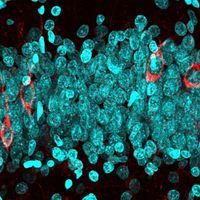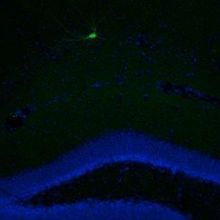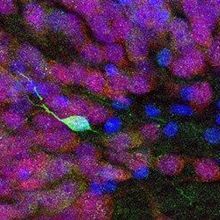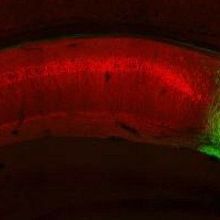Login
Subscribehippocampus

Image of the Day: Memory Erasure
Amy Schleunes | Feb 12, 2020 | 1 min read
By trimming synapses in the adult mouse hippocampus, microglia help facilitate forgetting.

Artificial Neurons Fire in Life-Like Patterns
Ashley Yeager | Dec 4, 2019 | 2 min read
The silicon chips receive and send electrical signals, recreating activity from neurons in the rat brain that play a role in breathing and thinking.

Long-Lived Neural Stem Cells Identified in Living Mice
Ashley Yeager | Oct 22, 2019 | 2 min read
New, unpublished results show some of the cells produce new neurons for up to 90 days, much longer than a previously identified set of neural stem cells that only generate neurons for a month or two.

New Tools in the Works to Probe Adult Human Neurogenesis
Ashley Yeager | Oct 7, 2019 | 6 min read
Conflicting results on the existence of new neurons in adults have researchers designing new ways to identify and count neuronal progenitors—and finally get to the bottom of neurogenesis.

Nick Turk-Browne Explores the Neuroscience of Learning
Catherine Offord | May 1, 2019 | 3 min read
The Yale University cognitive neuroscientist studies how the brain extracts patterns from experiences.

More Evidence that Humans Do Appear to Create New Neurons in Old Age
Ashley Yeager | Mar 25, 2019 | 4 min read
Despite doubts last year about human adult neurogenesis, a study shows even 80-year-olds develop new cells in the hippocampus, but such growth is diminished in patients with Alzheimer’s disease.

A New Role for Platelets: Boosting Neurogenesis After Exercise
Katarina Zimmer | Mar 21, 2019 | 4 min read
A mouse study finds that when blood platelets are activated during exercise, they release factors that increase the number of newborn neurons in the hippocampus.

New Map Shows Brain Changes Associated with Alzheimer’s
Catherine Offord | Feb 4, 2019 | 2 min read
The protein expression data, which are freely available online, could help identify new drug targets for the disease.

A Keen Sense of Smell Appears to Go Hand in Hand with Spatial Memory
Shawna Williams | Feb 1, 2019 | 3 min read
Authors of a small study say the two abilities likely evolved in tandem.

Image of the Day: This Little Piggy
Sukanya Charuchandra | Sep 20, 2018 | 1 min read
Recordings of electrical activity in porcine brains finds similarities to rodent neural tissue.

Forgotten Memories Brought Back in Mice
Sukanya Charuchandra | Jul 5, 2018 | 3 min read
By stimulating specific neurons in mouse brains, researchers demonstrate that memories from infancy are not lost, but merely difficult to access.

Image of the Day: Memory Jogger
Sukanya Charuchandra | Jun 12, 2018 | 1 min read
Scientists can livestream how the mouse brain’s hippocampus maps the physical world and accesses those memories.

Mouse Moms’ Behavior Affects Pups’ Genome Structures
Abby Olena, PhD | Mar 22, 2018 | 3 min read
Mice who get less attention from their mothers have more copies of a common retrotransposon in the genomes of their hippocampal neurons.

Study Finds No Neurogenesis in Adult Humans’ Hippocampi
Ashley Yeager | Mar 7, 2018 | 4 min read
Failure to produce evidence of neural precursor cells and immature neurons raises questions about the role of the process in learning and memory.

Study Pinpoints Potential “Master Regulator” of Age-Related Cognitive Decline
Shawna Williams | Dec 18, 2017 | 4 min read
Upping a gene’s expression in rat brains made them better learners and normalized the activity of hundreds of other genes to resemble the brains of younger animals.

The Cellular Hallmarks of Consciousness
Anna Azvolinsky | Sep 21, 2017 | 4 min read
Recording from single neurons of epilepsy patients, neuroscientists show that both the strength and timing of neuronal firing are important to consciously perceive a visual object.

Image of the Day: Hippocampal Jalapeno
The Scientist | Aug 30, 2017 | 1 min read
To tease apart brain regions involved in forming versus remembering memories, scientists engineered mice whose brain cells could be manipulated and tagged.

Image of the Day: Rainbow Matter
The Scientist | Aug 14, 2017 | 1 min read
Using diffusion-weighted tractography, scientists can produce a detailed image of the minute neural fibers within a mouse brain.

Image of the Day: Release Your Inhibitions
The Scientist | Jul 31, 2017 | 1 min read
A drug commonly used to treat clinical depression sets its effects in motion by hampering the release of an inhibitory neurotransmitter in mice.
